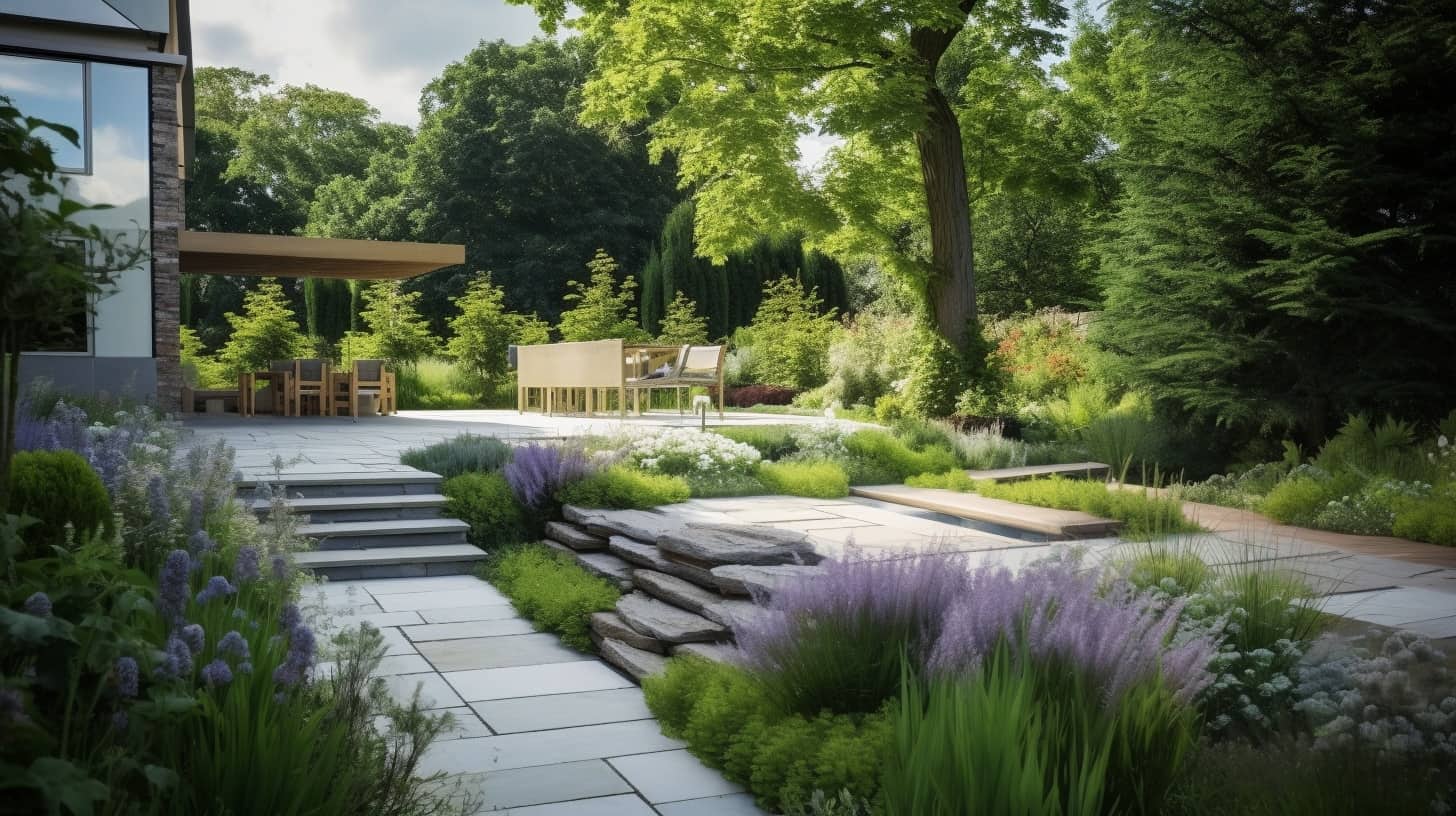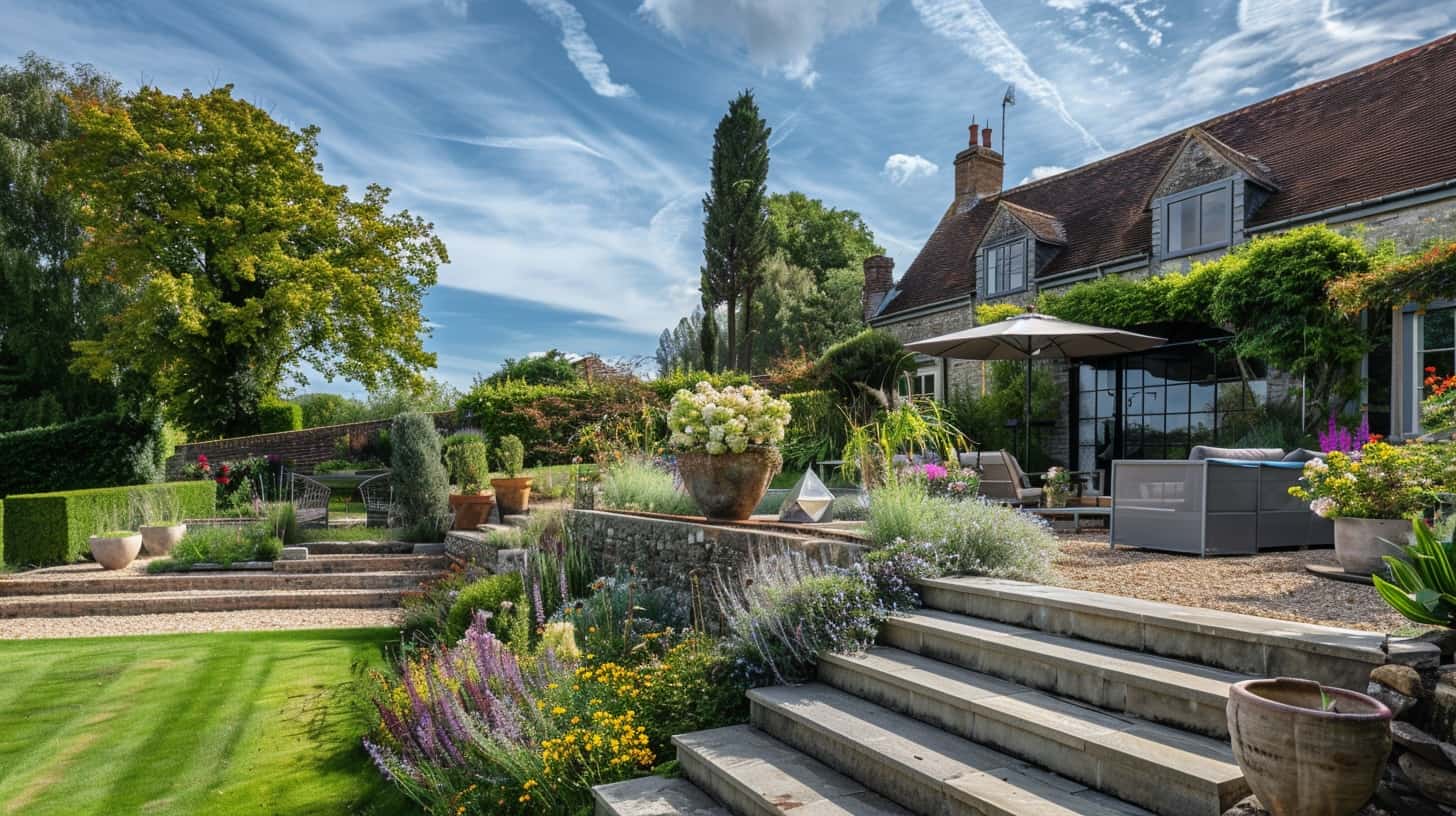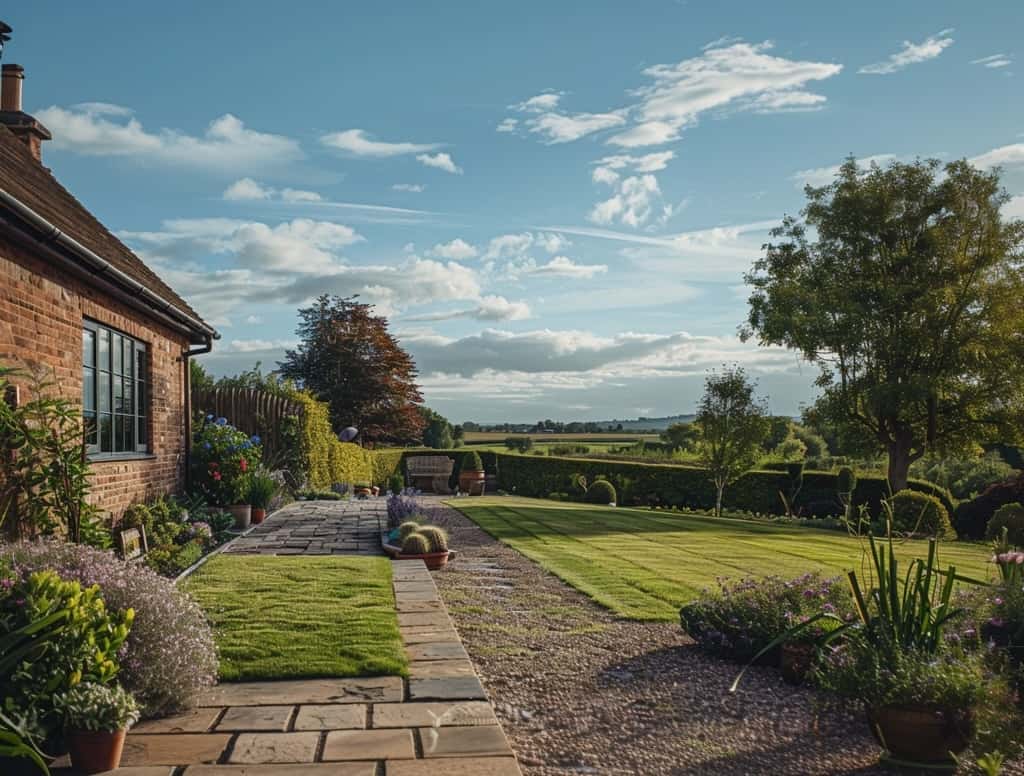Being a full-service garden design and construction company in Surrey and West Sussex, Gardenscapes is experienced in providing landscaping solutions for sloped gardens.
No matter what you call your sloping garden (inclined, gradient, steep, stepped, elevated, tiered, rolling, hilly, hilltop, multi-level or cascading), designing a sloped garden often requires more planning and creativity to make the most of the landscape.
Successful sloped garden design involves a balance of aesthetics, functionality and erosion control, so consulting with a professional garden design and landscape company is beneficial for these complex projects.
Our garden design service starts at £2,700 + VAT, while our garden landscape construction prices start from £20,000 + VAT.

Ten Techniques For Designing A Sloped Garden
Designing a sloped garden can be a creative challenge. Here are ten essential techniques our garden designers consider when designing a sloping landscape

Slope Assessment: Understanding the slope's gradient, direction and drainage patterns.

Water Management: Consider drainage solutions like French drains or swales to control water runoff.

Slope Assessment: Understanding the slope's gradient, direction and drainage patterns.

Slope Stabilisation: Employing erosion-control methods like erosion blankets or plantings to stabilise the hill.

Slope Stabilisation: Employing erosion-control methods like erosion blankets or plantings to stabilise the hill.

Plant Choice: Selecting plants that thrive on slopes, like groundcovers, and plants with deep roots to prevent erosion.

Slope Terracing: Using retaining walls or steps to make the slope more manageable, creating terraced and tiered levels.

Garden Hardscaping: Incorporating patios, decks, or seating areas to maximise usable space.

Slope Terracing: Using retaining walls or steps to make the slope more manageable, creating terraced and tiered levels.

View Optimisation: Capitalising on the unique vantage point a slope offers by framing scenic views with plants and structures.

Garden Pathways: Designing winding pathways that follow the natural contours of the slope for accessibility.

Water Management: Consider drainage solutions like French drains or swales to control water runoff.

Garden Hardscaping: Incorporating patios, decks, or seating areas to maximise usable space.

Focal Points: Strategically placing focal points or garden features to draw the eye and add interest.

Plant Choice: Selecting plants that thrive on slopes, like groundcovers, and plants with deep roots to prevent erosion.

View Optimisation: Capitalising on the unique vantage point a slope offers by framing scenic views with plants and structures.

Garden Pathways: Designing winding pathways that follow the natural contours of the slope for accessibility.

Lighting Installation: Installing outdoor lighting enhances safety and aesthetics, especially for night-time use.

Focal Points: Strategically placing focal points or garden features to draw the eye and add interest.

Lighting Installation: Installing outdoor lighting enhances safety and aesthetics, especially for night-time use.
Sloped Garden Design And Construction Benefits
Proper garden design and landscaping can help mitigate any negatives associated with hilltop gardens and turn them into positives.
By creating varied levels and tiers, landscapes can look visually stunning with opportunities for rock gardens, cascading water features, focal points, and other creative elements.
One of the significant benefits of a hilltop garden is the stunning vistas and panoramic views across your local area and beyond.
Maintaining a sloped garden can provide physical activity and exercise opportunities, so joining a gym is unnecessary!

Frequently Asked Sloped Garden Design Questions
You can implement several strategies to stabilise a sloping garden and prevent soil erosion. Terracing can reduce the slope gradient, which helps control run-off and erosion. Constructing retaining walls can also help by holding back soil and creating flat areas for planting. Ground cover plants are beneficial as their root systems help stabilise the soil. Additionally, applying a thick layer of mulch can reduce surface runoff and erosion.
Combining terracing and retaining walls can effectively manage water flow when managing water drainage in a sloping garden. Installing French drains can redirect excess water away from critical areas. Swales are shallow, vegetated channels that can effectively slow down and direct water. Rain gardens are also helpful as they capture runoff and allow soil absorption in lower areas.
To make a sloping garden more accessible, you can install paths and steps that provide safe navigation with a gentle incline or steps. Switchback paths, which zigzag, can reduce the steepness of the path. Additionally, creating terraces can make flat areas more accessible and maintainable.
For planting in a sloping garden, native plants are ideal as they are well-adapted to local conditions and require less maintenance. Ground covers, such as creeping junipers, ivy, or periwinkle, can stabilise the soil. Deep-rooted shrubs and trees also provide structure and stability to the slope.
Creating visual interest in a sloping garden can be achieved by using levels, such as terraces and variations in plant height, to create layers. Incorporating features like waterfalls or streams following the natural incline can add beauty. Playing with colours and textures through various plants adds vibrancy and interest. Additionally, installing garden structures like pergolas, gazebos, or benches can serve as focal points in the garden.
Contact Gardenscapes About Your Sloped Garden Solutions

